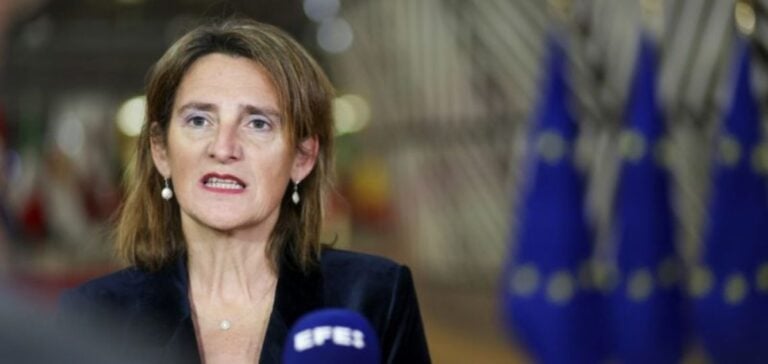Teresa Ribera, Spain’s Minister of Ecology, is emerging as a prime candidate for a position as European Commissioner in the new team headed by Ursula von der Leyen.
Her potential appointment comes at a pivotal moment for the European Union’s (EU) energy policy, as debates intensify over the future of the European Green Pact.
Ribera is keen to link economic competitiveness and ecological transition, a key area of development for the EU against a backdrop of growing international pressure on energy markets.
Strategic positioning and policy priorities
With a career rooted in environmental and energy policy, Ribera’s expertise is widely recognized.
A former Secretary of State for Climate Change, she also headed the Institute for Sustainable Development and International Relations (IDDRI) in Paris, where she took part in the discussions that led to the Paris Agreement in 2015.
In Spain, she has overseen major reforms, notably in the electricity market, aimed at promoting renewable energies such as green hydrogen.
However, her decisions and anti-nuclear stance are not unanimously supported in Europe, where several member states continue to regard nuclear power as an essential component in the decarbonization of their economies.
His approach, which combines pragmatism and firmness, has met with resistance at both national and European level.
Ribera believes that the costs of inaction on energy transition far outweigh those of the necessary reforms.
This perspective is accompanied by criticism from certain players, notably in the Spanish agricultural sector, who have expressed concerns about the impact of these policies on their activities.
Challenges and prospects within the European Commission
Teresa Ribera’s possible arrival at the European Commission opens up the prospect of intense debate on the future of EU energy policy.
Her clearly anti-nuclear stance could polarize discussions, particularly in the face of countries like France, which regard nuclear power as indispensable to achieving carbon neutrality targets.
This divergence of views between member states could complicate the search for a consensus on the next objectives of the Green Pact.
Ribera has also shown a certain inflexibility in dealing with Spain’s energy giants, such as Iberdrola and Repsol, whom she has publicly criticized for their lack of transparency and management of climate issues.
Her negotiating style, focused on dialogue but anchored in clear principles, could also cause friction with other European Commissioners and industrial interest groups, who favor a more gradual approach.
A double-edged commitment
As future Commissioner, Ribera will have to navigate carefully between the ambition to strengthen the EU’s competitiveness through the green transition and the reality of internal tensions between member states.
Europe’s energy strategy must not only meet the challenge of diversifying energy sources, but also respond to the economic requirements of individual member countries.
If Ribera maintains its current policy line, it will have to demonstrate that the transition to renewable energies can take place without compromising economic growth.
This will be a delicate balancing act, particularly in view of the growing influence of Central and Eastern European countries, which are reluctant to adopt policies perceived as too restrictive or costly.
Ribera’s ability to rally support beyond his traditional allies will determine his capacity to push through substantial reforms.





















